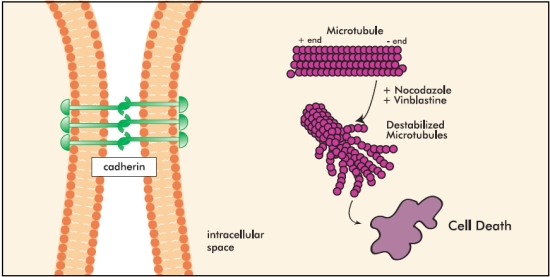Vascular disrupting agents
Vascular disrupting agents
Zybrestat (OXIGENE Inc.) is a synthetic prodrug, Combretastatin A4 Phosphate that is converted to Combretastatin inside endothelial cell. It was originally derived from the root bark of the South African Bushwillow tree (Combretum caffrum).
The mechanism of action is a vascular disrupting agent (VDA) by a dual action: tubulin depolymerizing agent and cell junction disruption.
These actions upset the physical structure of the existing blood vessels.
VE-cadherin disrupts the VE-cadherin/b-catenin complex interfering with cell-cell contact and induces loss of cell-cell contact that increases vascular permeability, leading to increased interstitial pressure and additional loss of blood flow.
Tubulin depolymerization acts at the colchicines-binding site of the b-subunit of endothelial tubulin, inducing disruption of the endothelial cytoskeleton that results in shape changes.
Normally flat, the endothelial cells become more spherical, and this decreases the size of the blood vessel lumen, causing decreased blood flow and thrombosis.
It seems that the cytoskeleton of newly formed cells is sensitive to CA-4-P, whereas the cytoskeleton of mature cells is not.
This appears to underlie the selective shutdown of neovascular vessels compared to that of normal vessels.
Currently Zybrestat has been tested intravenously-administered in clinical studies in patients with forms of macular degeneration.
The topical administration is being tested in animal studies.
A phase II study in patients with polypoidal choroidal vasculopathy (PCV) is initiated(33).
Current therapies active against wet AMD appear to have limited benefits in patients with PCV, and OXiGENE (Oxigene inc. San Francisco) believes the abnormal vasculature in the retina and choroid that contributes to PCV patients loss of vision may be susceptible to treatment with Zybrestat.
Figure 4 - The mechanism of action is a vascular disrupting agent (VDA) by a dual action: tubulin depolymerizing agent and cell junction disruption. These actions upset the physical structure of the existing blood vessels.
